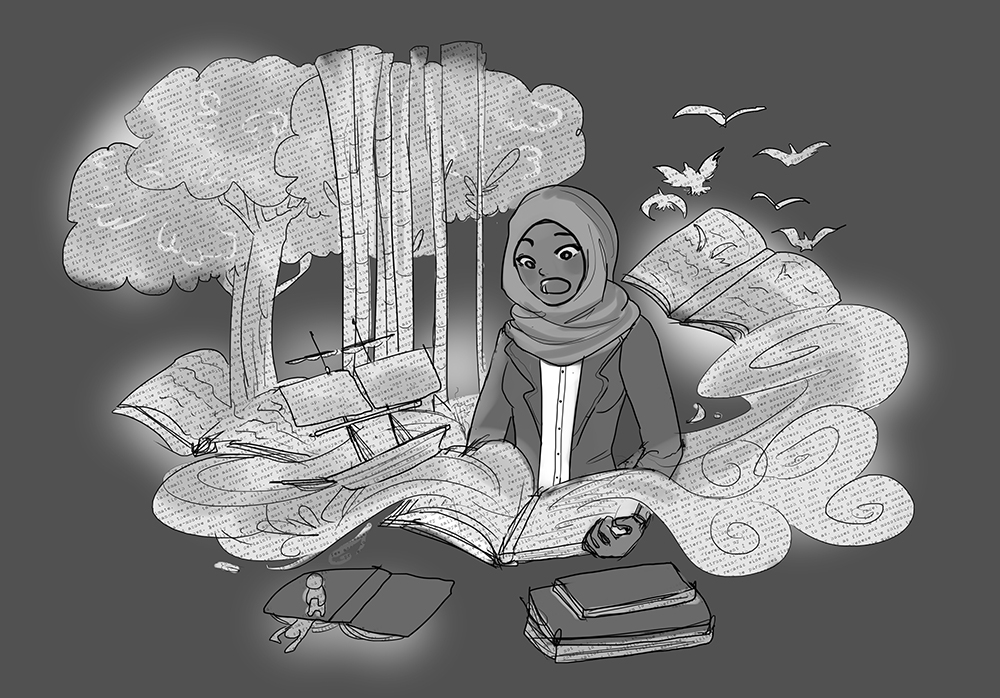Sushannah Smith | Contributor
Featured illustration: Kamal Al-Solaylee, author of Brown, speaks about what it means to be a South Asian Muslim author at The Word on the Street festival. | Jasmine Wiradharma
Bookworms from all over gathered outside of Toronto’s Harbourfront Centre and rejoiced at the annual The Word on the Street Book and Magazine Festival on September 25. The event featured everything literary, ranging from independent magazine and newspaper stands such as NOW, to book booths from multiple publishing companies like Penguin Random House to independent book publishers.
The event showcased multiple reading and writing associations and groups that encouraged poets and writers to become part of the community. There were organizations for every book genre imaginable: horror fanatics could join the Horror Writers Association; a group of elderly women who loved crime formed an organization called Mesdames of Mayhem.
One artist that was drawn to the festival was Kamal Al-Solaylee, the director of the undergraduate journalism program at Ryerson University and former theatre critic at The Globe and Mail. His novel Brown explores the truth about the racial tension between sects of South Asian Muslims, as well as the stereotypical ways in which South Asian people are perceived in the world.
Every chapter of his book takes place in a different country, where Al-Solaylee interviews South Asian and Muslim people of different careers and backgrounds, ranging from fashion designers to domestic maids, on how they are perceived in these environments.
“You’re asked to speak about a community as if you have to explain the actions of somebody and justify them like you know them, and I take on that role because somebody has to,” says Al-Solaylee.
Al-Solaylee encountered some difficulties trying to get interviewees to speak candidly. “People are just too afraid to talk about their experience in case someone reads [it] and puts two and two together. They will know that’s that person and they might be deported […] or they didn’t want to lose their jobs,” explains Al-Solaylee.
However, the issues cannot be ignored. Through the interpretation and personal experiences of real people, Al-Solaylee goes above and beyond to make his point heard. “The only way to make people care about a subject as wide as skin colour and racial experience is if there are true stories,” says Al-Solaylee.
Al-Solaylee started his journalism career before tensions and stereotypes towards people of Muslim faith were heightened. It’s very challenging to be a Muslim person in North America at the moment. Brown is a reflection of the difficulty of being a South Asian Muslim, having the fears and anxieties of a Western world projected onto them and the irrational conflation of race and religion.
The problematic construction of light skin versus dark skin is something that many cultures around the world face. Al-Solaylee elaborates on this in terms of what it means for South Asian people. “Whiteness remains an ideal for people,” says Al-Solaylee.
“I grew up with this culture that you avoid the sun and want to remain as light skinned as possible, because light skin meant social benefits and beauty and desirability.”
From personal experiences, Al-Solaylee finds Canada to be one of the best places to live, in regards to racial, religious and cultural acceptance.
“I think we have something really good going on here, but we shouldn’t take it for granted. Things could change—things have changed.” We have the ability to ensure that that change is for the better.
For people of colour who wish to become novelists, the path is not easy. It could be tomorrow, a month from now or even a few years from today for that to happen. What matters is taking the first step of claiming your right to write. Maybe it’ll happen when you decide to go on a stroll through The Word on the Street. Better yet, it could be the idea of taking the subway and seeing somebody on the train with your book or magazine in their hands and their eyes glued to the pages.
“You need to be in the world that you want to be a part of,” says Al-Solaylee. As people of colour, we need to be visible in the world we want to be a part of.
Festivals like The Word on the Street provide authors with a platform and offer support and exposure, which any artist can tell you is probably the hardest thing to find. It’s nice to know that Toronto strives to bring its artists together in a place where they are adored. It’s even more wonderful to show them that they are not alone and the city is on their side.
In today’s technology-driven age, it was nice to be surrounded by people who still find enjoyment in reading and literature. The volunteers and featured artists were friendly and the people working the booths were able to guide and recommend you to works of fiction and nonfiction that may suite your interests.
Local Canadian authors were featured and took to the stage to present and answer questions about their newest works. It was shocking to see just how many books were published. It was even more pleasantly surprising to see how much support Canadian writers received.


